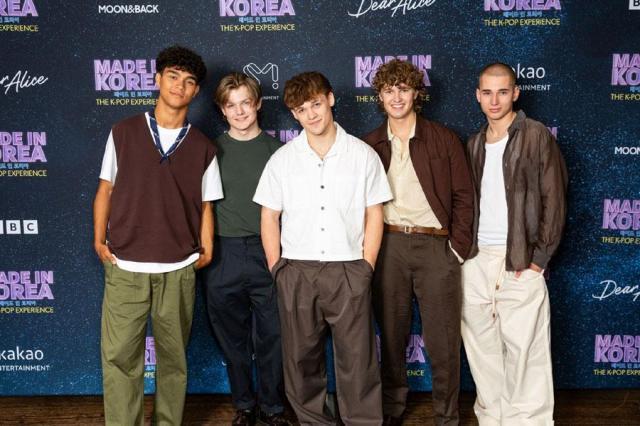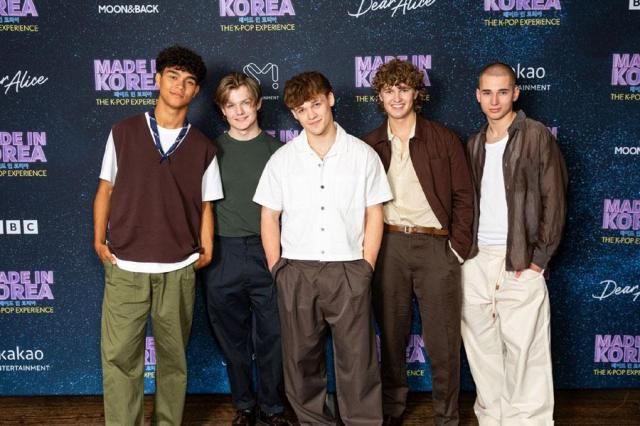
Showing a glimpse of the lives of K-pop trainees, the first episode introduces K-pop as a multi-billion global phenomenon, stating: "Six of the top 20 best-selling artists in the world were K-pop and 90 billion streams were by K-pop idols."
K-pop is becoming increasingly popular in the U.K. Girl group Aespa and boy group BTS have sold out shows in the country's largest arenas.
In 2023, the group Blackpink became the first Korean band to headline a U.K. festival at BST Hyde Park, where they played to an audience of 65,000. They were also awarded honorary MBEs by the king for their role in encouraging young people to engage with the global UN climate change conference at COP26 in Glasgow 2021.
There is certainly an appetite for shows about K-pop for western audiences. Netflix have released their own version of Made in Korea, Pop Star Academy: Katseye.
The docuseries follows 20 girls from Japan, South Korea, Australia and the U.K. going through a year of K-pop training to become the group Kasteye. It's a collaboration between the K-pop label Hybe and U.S. label Geffen (a subsidiary of Universal).
Generally speaking, K-pop is characterized by catchy and lively melodies and highly choreographed dance routines in perfect unison and fancy outfits. Inspired by various pop music genres – including but not limited to electronic dance, hip hop, and R&B – the genre became distinctive from the nation's traditional music, especially after a handful of pioneers began producing idol groups in the 1990s.
I'm South Korean and I'm studying cultural industries, so it's interesting for me to see westerners becoming K-pop-inspired idol groups. It's a famously competitive industry, which is already oversaturated with hopeful K-idols. Considering that the domestic market is small and highly saturated, their success will be a breakthrough for SM Entertainment and HYBE, as well as other K-pop companies, proving whether they can continue to grow beyond east Asia.
The production and delivery of this popular music genre have become more international than ever in recent years, with hundreds of choreographers, composers and producers worldwide contribute to creating K-pop songs and performances. In contrast, K-pop performers have until recently been predominantly Korean. But as the new shows demonstrate, this too is changing.
K-pop companies have hosted auditions outside the country to recruit foreign trainees to make their idols appeal to global audiences. Huge global music corporations like Sony, Universal Music Group and Virgin Records have also got in on the game, signing distribution contracts with major K-pop idols to promote their music in foreign markets.
This search isn’t because there is a lack of willing hopefuls in Korea. There were around an estimated 800 trainees waiting to debut in 2022. But Korea's population is only around 50 million and record companies want to appeal beyond the domestic market, so they are hoping recruiting non-Korean stars will help do that.
Music agencies in the west tend to find new artists who are already gifted and then largely serve as intermediaries arranging things like tours, marketing and artists’ wider schedules. However, major K-pop companies have developed a unique system of finding and launching new artists. This involves hosting auditions with a competition of at least 1,000 to 1 odds. The winners then undergo years of of acting, vocal, and dance training before debuting.
To make the vocals flawless and the dance moves precise, trainees, known as "yeonseupsaeng," are expected to spend up to 17 hours per day practicing performances and training for several years – although they aren't guaranteed to become professional artists. Even if they do become successful, their private lives – including their dating lives – are strictly controlled.
It is no exaggeration to say that the industry is labor-intensive as well as capital-intensive, built on the blood, sweat and tears of yeonseupsaeng.
The first episode of Made in Korea ends with SM's director Hee Jun Yoon's critique of the Britons' first performance. It's difficult viewing for those unfamiliar with the harsh world of K-pop. To borrow the words of BBC's unscripted content head, Kate Phillips, it makes "Simon Cowell look like Mary Poppins."
Some might question the prefix "K-" being used to describe these international groups but the genre will remain decidedly Korean. It is Korean companies which will lead the production mechanisms and the domestic market will continue to serve as the testbed for new artists. But the success of Dear Alice and Katseye is important if the genre is to survive and continue to grow beyond Korea.
-------------------------------------------------------------------------------------------------------------------------
Taeyoung Kim is a lecturer in communication and media at Loughborough University in England.
This article was republished under a Creative Commons license with The Conversation. The views and opinions in this article are solely those of the author.
https://theconversation.com/the-harsh-process-of-becoming-a-k-pop-star-is-opening-to-western-performers-237686
Copyright ⓒ Aju Press All rights reserved.


View more comments